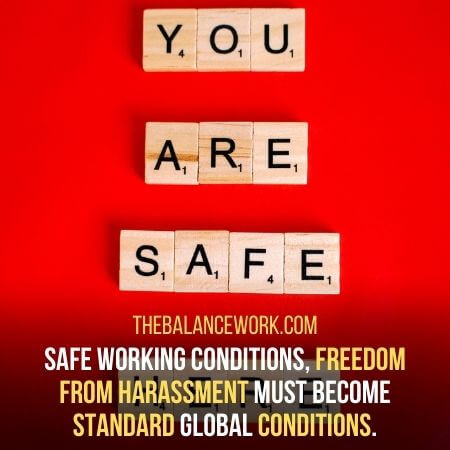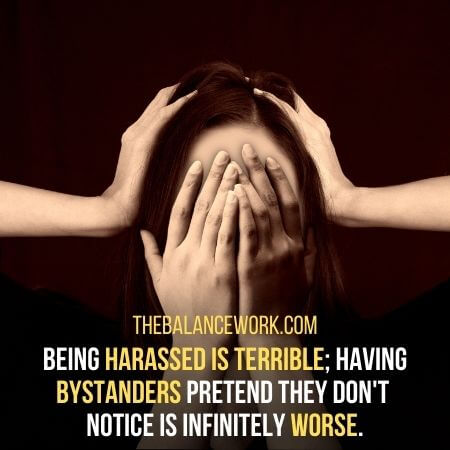Workplace harassment can take many different forms. Here’s what to do if a coworker is harassing you.
All types of harassment have in common that they can make going to work every day a nightmare.
8 Things To Do If A Coworker Is Harassing You
If a coworker is harassing you, it’s essential to take action immediately. Here are some steps to take:
1. Talk To Your Supervisor:
Your first step should be to talk to your supervisor. They may not be aware of what’s going on, and they may be able to help resolve the issue.

Your boss should also tell you what the company’s policy is on workplace harassment.
Moreover, going to your boss shows the harasser you’re not tolerating their behavior.
If your boss listens to you, they may be able to deal with the situation quickly and effectively.
If your boss does not take your complaint seriously or tries to dismiss the case, you may want to consider talking to a lawyer.
Ideally, your boss should provide you with security and support. But unfortunately, that’s not always the case.
Some bosses find it hard to fire harasser employees. It is because they have some advantage of keeping them in the company.
Your harasser may be favoring the boss in some way. Or they may have connections with upper management.
If your boss tries to sweep the situation under the rug, you may need to go over their head.
Note: If your boss is the one doing the harassing, you can still talk to HR.
2. Keep A Record Of The Behavior:
It’s essential to keep a record of the harassment you’re experiencing.
This can be in the form of a diary or journal, where you document each incident. Make sure to include as many details as possible, such as:
– What was said or done
– Who was present
– When it happened.
– What your reaction was
Your record should also include:
– CCTV Footages
– Emails
– Photos
– Videos
– Voice recordings.
Having this documentation will be helpful if you decide to take legal action.
Also, it can also help support your case if you choose to file a complaint with your company’s HR department.
3. File Complaint To HR If A Coworker Is Harassing You:
If talking to your boss didn’t help, your next step should be to contact HR.
Human resources are there to protect both employees and employers. They should help you with your situation.
Remember that HR is not required to keep your complaint confidential.
So if you want to remain anonymous, you may want to consider talking to a lawyer first.

When you file your complaint, be sure to include as much documentation as possible.
This will help support your case and make it more likely that HR will take action. The complaint can be like this:
– Your name, job title, and contact information
– The name of the person who is harassing you
– The dates and times of the incidents
– A description of the harassment
– Witnesses to the harassment
– Any other relevant information.
4. Consider Taking Legal Action If A Coworker Is Harassing You:
If you’ve tried everything and nothing worked, consider taking a legal action.
This is usually a last resort, but it’s essential to know that you have this option.
You can file a complaint with the Equal Employment Opportunity Commission (EEOC). You can also file a complaint to your state’s fair employment agency.
These agencies will investigate your claim. They will decide if there is enough evidence to take action against your harasser.
If they find harassment, they may take legal action on your behalf. Taking legal action can be a long and challenging process.
You should make sure you’re prepared for it before taking this step.
5. Get Ready For Aftermaths Of Legal Complaint:
After you file a legal complaint, what follows is:
– The agency will investigate your claim
– They may contact your harasser for a response
– They will decide if there is enough evidence to take legal action
– If they decide to take legal action, they will file a lawsuit on your behalf
– The harasser will likely be allowed to settle the case
– If the case goes to trial, they will ask you to testify
– The outcome of the case can be difficult to predict.
6 Stay Safe If A Coworker Is Harassing You:
No matter what you do, it’s important to remember to stay safe.

Harassment can be a very stressful and dangerous experience.
If you feel like you’re in danger, make sure to take measures to protect yourself. This may include things like:
– Changing your phone number or email address
– Getting a restraining order
– Moving to a new location
– Quitting your job.
7. Get Support From A Friend/ Family Member/ Therapist:
Dealing with workplace harassment can be highly stressful. It’s essential to have a support system in place to help you through this tough time.
Talk to a friend or family member about what you’re going through. They can offer you emotional support and help you stay positive.
You may also want to consider talking to a therapist. They can help you deal with the stress of harassment and provide you with coping mechanisms.
We understand that finding the time and money to see a therapist can be challenging.
If this is the case, consider looking for a therapist who offers online sessions.
8. Take Care Of Yourself If A Coworker Is Harassing You:
It’s important to remember to take care of yourself during this time. This includes:
– Make sure to get enough sleep and exercise.
– Eat a healthy diet and avoid drugs and alcohol.
These things can all help you deal with the stress of harassment.
Taking care of yourself will help you stay strong and focused on what you need to do to get through this difficult time.
Sample Scripts To Talk To HR Or Boss:
Here are some sample scripts you can use to talk to HR or your boss about the harassment you’re experiencing:
Sample Script 1:
Hi,
I wanted to talk to you about something happening at work. I have been the target of workplace harassment from a coworker.
It’s been going on for a while. I’ve tried to handle it myself, but nothing has changed. I’m not sure what to do at this point.
I wanted to talk to you about it because I’m unsure what the next step should be.
I don’t want to make a formal complaint if there’s no need, but this affects my work and mental state.
Do you have any advice on how to handle this situation?
Thank you for your time.
Sample Script 2:
I wanted to let you know that I’ve been experiencing harassment from a coworker.
I’ve tried to handle it myself. However, it’s been going on for a while, affecting my mental state.
I’m not sure what to do at this point. I wanted to talk to you about it because I don’t want to make a formal complaint if there’s no need.
However, I also don’t want this to continue. Do you have any advice on how to handle this situation?
Thank you for your time.
What To Avoid If A Coworker Is Harassing You:
There are a few things you should avoid doing if a coworker is harassing you:
1. Don’t Confront The Harasser:
Don’t confront your harasser yourself. This could escalate the situation and make it worse.
It’s best to leave it up to the professionals to handle. The intense reactions to the confrontation can be:
– You feeling humiliated
– The harasser getting defensive
– The situation getting physical
2. Don’t Ignore The Problem If A Coworker Is Harassing You:
Don’t ignore the problem and hope it will go away. It’s essential to take action and get help.

If you miss the harassment, it could continue or get worse. The results of ignoring harassment also include:
– You feeling more isolated and alone
– The harasser feeling more powerful
3. Don’t Blame Yourself If A Coworker Is Harassing You:
Don’t blame yourself for the harassment. It’s not your fault, and you didn’t do anything to deserve it.
The harasser is the one at fault, not you. To not blame yourself, keep reminding yourself:
– I am worthy of respect
– This is not my fault
– I did nothing to deserve this
4. Don’t Bottle Up Your Emotions If A Coworker Is Harassing You:
Don’t bottle up your emotions and keep them all inside. This can lead to stress and anxiety.
Talk to someone about what you’re going through to let all of your feelings out.
Don’t try to handle the situation on your own. Get support from HR, your boss, or a therapist.
Keeping everything inside can also:
– Make you feel isolated and alone
– Encourage you to take action
5. Don’t Quit Your Job If A Coworker Is Harassing You:
Don’t quit your job because of the harassment. This will make the harasser feel they’ve won, and they’ll know they can get to you.
It’s important to stay strong and continue to fight. Quitting your job will only make the situation worse.
Why Is It Important To Take Action?
It’s essential to take action if someone is harassing you at work because:
1. Your Deserve To Feel Safe & You Have Rights:
You deserve to feel safe at work. No one should feel unsafe or uncomfortable because of their job.
Every person has the right to feel safe at work. You also have rights in this situation.
Harassment is illegal, and you have the right to file a complaint.
Moreover, your company should have a policy on harassment. It can be something like you can read about your rights on the website.
2. It’s Illegal If A Coworker Is Harassing You:
Harassment is illegal. You have the right to report it.
So the system can punish the harasser for their actions. Illicit actions can be severe and can include:
– Physical assault
– Sexual assault
– Rape

Therefore, it is essential to take action to protect yourself and others.
3. It Can Affect Your Mental Health If A Coworker Is Harassing You:
Harassment can negatively affect your mental health. If someone is harassing you, you might experience:
– Anxiety
– Depression
– Panic attacks
– Insomnia
It’s essential to get help if you’re experiencing any of these symptoms. You can talk to your doctor, a therapist, or a support group.
Taking action can also help you feel more in control of the situation and less alone.
4. The Harasser Can Be Fired:
If you take action, the company can fire the harasser. This will send a message that harassment is not tolerated in the workplace.
It can also make the harasser think twice before harassing someone again.
Also, if they fire the harasser, it will be easier for you to avoid them.
If your company does not take any action, you can file a complaint with the government.
5. You Can Help Other People:
If you take action, you might help other people who are being harassed.
Your story can give them hope and show them that they’re not alone.
Talking about your experience can also create change in the workplace. People need to know that harassment is not tolerated.
11 Forms Of Workplace Harassment By Coworker
There are different types of workplace harassment by coworkers.
It’s essential to be aware of all the different types so that you can identify them if they’re happening to you.
The following is a list of some of the most common types of workplace harassment:
1. Physical Harassment:
Physical harassment is any type of unwanted physical contact. This can include:
– Touching
– Pushing
– Pulling
– Slapping
– Kicking
2. Verbal Harassment:
Verbal harassment is any type of unwanted verbal communication. This can include:
– Name-calling
– Threats
– Yelling
3. Sexual Harassment:
Sexual harassment is any type of unwanted sexual attention or advances. This can include:
– Inappropriate touching

– Unwanted sexual comments
4. Psychological Harassment:
Psychological harassment is any type of behavior intended to scare, intimidate, or isolate someone. This can include:
– Stalking
– Spreading rumors or gossiping
– Isolating someone from their friends or coworkers
5. Racial Harassment:
Racial harassment is any type of discrimination against someone because of their race. This can include:
– Using racial slurs
– Displaying racist symbols
– Making racially charged comments
6. Religious Harassment:
Religious harassment is type of harassment against someone because of their religious beliefs. This can include:
– Making jokes about someone’s religion
– Telling someone that they’re going to hell
– Refusing to serve someone because of their religion
7. Age Harassment:
Age harassment is any type of harassment against someone because of their age. This can include:
– Telling someone they’re too old/young
– Treating someone differently because of their age
8. Disability Harassment:
Disability harassment is any type of harassment against someone because of their disability. This can include:
– Ignoring them or speaking to them in a condescending way
– Making fun of their disability
9. Pregnancy Harassment:
Pregnancy harassment is any type of harassment against someone because they’re pregnant. This can include:
– Making comments about the person’s body
– Asking personal questions about the pregnancy
10. Gender Harassment:
Gender harassment is any type of harassment against someone because of their gender. This can include:
– Making sexist jokes

– Refusing to use someone’s preferred pronouns
11. Sexual Orientation Harassment:
Sexual orientation harassment is harassment against someone because of their sexual orientation. This can include:
– Making homophobic or transphobic jokes
– Refusing to serve someone because of their sexual orientation
It is essential to identify which behavior is appropriate and which is not.
Thus, if you find someone being inappropriate, take a stand immediately.
Conclusion:
If a coworker is harassing you, it’s essential to speak up. Harassment is not tolerated in the workplace, and you have a right to feel safe at work.
There are many different types of workplace harassment. It’s essential to be aware of all the different types.
If a coworker is harassing you, you can talk to your supervisor, file a complaint with HR, or even contact the police.
Don’t let anyone make you feel uncomfortable at work.
Last Updated on 3 hours by Eesha Khan
- Why Does My Boss Wink At Me? 6 Potential Reasons - October 5, 2023
- Is It Legal For Your Employer To Call Your Doctor? No, But… - October 4, 2023
- 12 Ways To Deal With A Low IQ Person - September 22, 2023